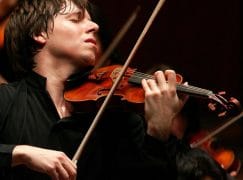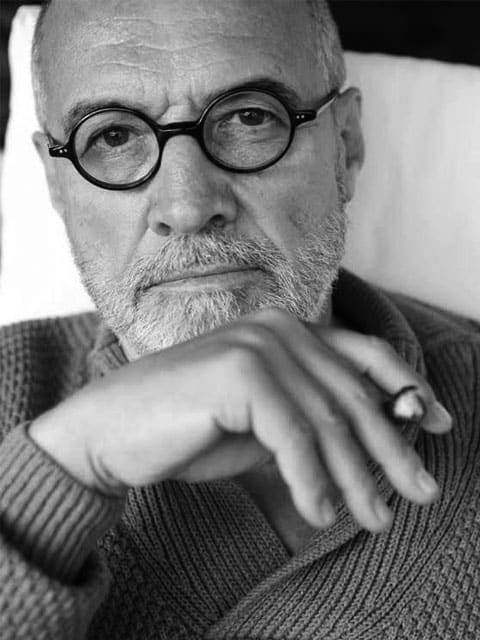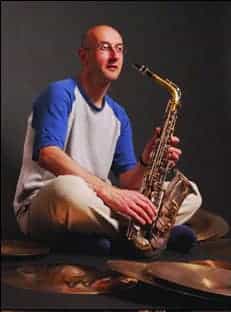Are you suffering European summer sweats? Read this
mainFrom our string quartet diarist Anthea Kreston:
My God, sometimes it is so hot while we are playing a concert. These past tours – with the temperature flirting dangerously close to 100 degrees outside – inside the hall (or castle or church or barn), it feels like I am standing on a hot plate while under a glass dome, and someone has generously offered to shine a heat lamp directly on to my head.
It’s different in the States, where musicians and audiences are used to being exactly the same temperature every day,
regardless if there is a blizzard or a forest fire outside the building. Our little climate bubble. Here, the outside and inside are actually related – and retrofitting a 900 year old castle for climate control just isn‘t high on the „to-do“ list.
So I do everything I can. Pare down my outfit, drink lots of water, try to cut the rehearsal short before the concert, put my hair up. But – there are still a gaggle of spotlights (fore, side, back and above) trained on us, and by half-way through the first movement, the sweat is running down the back of my legs, and the fingerboard is glistening. It’s just gross. I basically have to wear my daughter’s snorkel equipment to safety open my backpack when I get back from tour. My feet swell to twice their normal shape, and I start to make bizarre mistakes. I try to pace myself, but that just isn’t realistic. Not with Bartok. It’s now or never out there. All for one, and one for all. This last concert I just stood in a cold shower during intermission.
It feels like my brain is inside a cloud – and I have no choice but to just let go and have my body do what it knows how to do. A study from Loughborough University showed that a 5 percent drop in water levels can cause 25-30 percent loss in energy and even a slight drop of 3 percent can cause ‘fuzzy thinking’ and brain fog. I have no idea how much 5 percent is, but I can imagine that completely soaking through a concert outfit by the end of the first piece must be up there somewhere. But there is never a moment when I can give less than 100 percent. No how no way – I am way too stubborn and proud to admit any weakness. And can you imagine ‘fuzzy thinking’? Haha – not an option.
I am forever asking the stage manager to open the windows, leave the church doors open – anything. But, once the music starts, we are closed back into our little heat cocoon. It’s noisy out there. In Lübeck, I just went out to the audience myself and started to open the massively tall windows, and before I knew it, the overly heated audience was all up helping, sticking umbrellas into the windows to keep them open. It was nice, in the slow movement of Bartok, to hear the bells of all the different churches chiming for the 9:00 hour, commingling with the stagnant chords of Bartok 2. The breeze, and the sounds of music and the marking of time made it all a bit more possible.
So – they have our water and towels ready for us back stage – and the summer season is coming to a close. Come winter, those old castles will have a little symphony of hot water clanking in the pipes, and the hiss of steam from the radiators.






It may not be so different in the US. Many orchestras play summer concerts outdoors and many is the time I have sat at Tanglewood amazed that the BSO can handle the heat + humidity and mostly still play in tune! I would imagine wind and string players (and maybe even some brasses) would be able to chime in here on the difficulties of playing outdoors in the heat and sometimes damp!
Playing outdoors in hot, humid weather is horrible. Years ago I was playing a gig in Kentucky in July – unforgettable. Sweat drips down your forehead making reading the music difficult. Your hands sweat and get your hands wet and hitting the right keys is harder – they get slippery. Add to that the problem of music blowing around so you have to use clips, which makes page turns difficult. And then there are the bugs that are attracted to the bright lights. It’s no fun! Intonation is quite difficult, but pros compensate. I’ve sat through La Boheme in Santa Fe with heavy downpours covering the audience – they’ve improved the outdoor facility greatly in recent years. Winter is worse in many ways: your fingers don’t want to move. You can wear gloves, but the finger tips need to be cut off. Intonation does go to heck. Reeds respond oddly. When the venue only has metal seats your butt freezes. I’ve played at two presidential inaugurations outside in January – bitter cold and will never do it again.
Hi John –
Yes I also recall many steamy summer concerts and dry ones in the States! It just seems a bit more de riguer here. Or maybe I am just older and hotter! (Haha)
You have my sympathies. 100 degrees F = 37.8 degrees C
Air conditioning is practically unknown in private houses in Europe, and is few and far betweeen in public and commercial buildings due to the green energy mania that has almost doubled the cost of a kWH (including taxes to fund the renewable energy bureaucracies). I’m no USA fan but at least they know what air conditioning is.
The Ensemble I’m involved with plays on gut strings so changes in temperature and especially heat/humidity causes havoc. I remember one concert where the cellist was unable to retune mid-program. The Ensemble was playing in an historic stone building with no windows (originally a prison dormitory for women) – freezing cold in the winter, but an oven in a hot summer – the humidity had caused the pegs to swell and they couldnt be moved. Finally the second cellist had to hold the instrument while he used both hands to shift the pegs to something approximately ‘in tune’. We removed that venue from our list of options until we know they have fitted it with airconditioning!
Well, there’s a heat advisory in Chicago today — the heat index is up to 105 degrees (f). Your story brings to mind a concert we held at Thrasher Opera House in Green Lake, WI (a charming small resort town) during my time as E.D. of their summer chamber music festival. The artists were the Trio Settecento, a Baroque ensemble with the well known artists Rachel Barton Pine, violin, John Mark Rozendaal, viola da gamba, and David Schrader, harpsichord. The air conditioning went off, and of course it was one of the hottest, most humid days of the summer. David had to completely retune the harpsichord during the — extremely long – -intermission. But not unlike your audience in Lübeck who jumped up to help open the windows, people retained their good natures and stuck it out to the end, as did, fortunately, the artists!